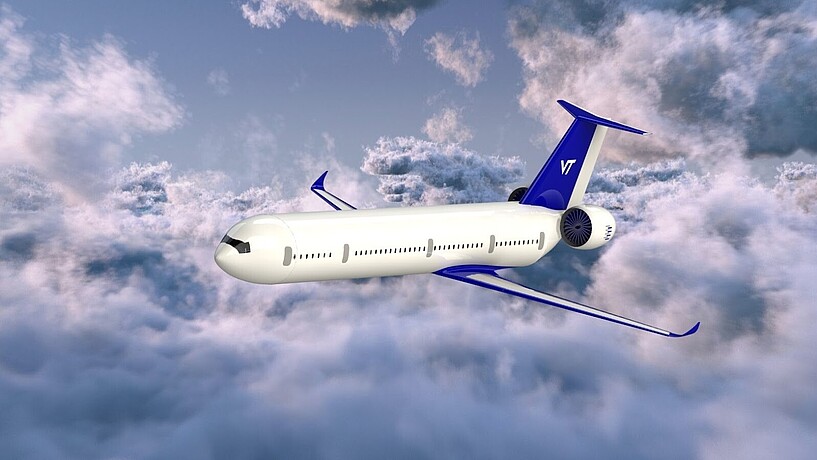In the annual USA-wide AIAA competition, engineering students work on a simulated but real problem. The jury includes experts from industry, government and academia. Virginia Tech students regularly enter the AIAA competition as part of their senior capstone design project. Professor Jutta Abulawi (HAW Hamburg) and Professor Pradeep Raj (Virginia Tech) have tried different approaches to integrate Hamburg students into Virginia Tech design teams. Joint projects are important building blocks to strengthen and deepen the strategic university cooperation with Virginia Tech as part of the 'HAW goes USA 2020' strategy.
For Jutta Abulawi, the project is a matter close to her heart and one in which she invests a lot of time and energy: 'Our degree programmes prepare students for the technical challenges of engineering, but this kind of project gives them an insight into the challenges of international teamwork that is common in today's aviation industry,' says Jutta Abulawi. 'It gives them a realistic as well as a practical experience in organising a project and working in a team where different languages, cultures, educational backgrounds and locations play a role.'
Virtual design projects and international cooperation
In the 2019/20 academic year, student teams were asked to design an aircraft that took into account the challenge of increasing air traffic and would help to reduce airport congestion. The short-range aircraft should have a passenger capacity of 400 passengers (approximately twice as many as aircraft of comparable range) with a two-class configuration and a range of 3,500 nautical miles. The date to market was set for 2029.
Over a period of nine months, two HAW Hamburg Bachelor students worked with the Virginia Tech team on the design. Valentin Krebs was an exchange student and DAAD scholarship-holder on site in Blacksburg while Richard Zwetzich joined as a virtual team member from Hamburg. The team gave itself the name 'Over the Pond' in reference to the cooperation across the Atlantic. 'Since the requirements of the aerospace industry are similar internationally, it is of great advantage to have different perspectives on the same problem. In this way it is possible to think out of the box and create innovative solutions by combining or complementing the advantages of different approaches,' explains Valentin Krebs of his participation in the project.
'Project Exo'
Entitled 'Project Exo', their aircraft design consisted of a composite, wide fuselage with low mounted wings and a T-tail configuration. Two turbofan engines mounted on the tail would reduce fuel consumption by boundary layer exhaust. Other electric aircraft systems were used to reduce operating costs and maintenance requirements. The highlight was the aircraft's comfortable 2-3-3-2 staggered three-speed seating configuration, which enabled an average boarding time of an impressive 27 minutes (simulated on the basis of over 1,500 parameters used). This would allow nine efficient cycles per day.
The result is a successful combination of the strengths of both universities: 'While our colleagues from Virginia Tech optimised cruise speed for the design range, the HAW students tackled the major problem of slow (de)boarding time of a classical cabin due to the high passenger capacity requirement,' explains Valentin Krebs. 'Aside from physical difference in location, we were working with people coming in with a completely different knowledge base,' adds Amanda Butynes, Virginia Tech student and team leader of 'Project Exo', about her Hamburg colleagues. 'In the HAW Hamburg programme, they focus heavily on the cabin, which is not something we typically do here at Virginia Tech. That gave us depth in an area we would not have exposure to if they were not present, and added a greater level of expertise to that part of the proposal. There was a lot of value in the different perspectives.'
Lessons from international project work
But these kinds of cooperation also show the challenges that international projects can bring with them. That is precisely why they are such good preparation for later professional life. The HAW Hamburg students had already gained a lot of project experience through Jutta Abulawi's Integrative Project module and were very familiar with planning tools. Nevertheless, communication with the team members in the USA did not always run smoothly and some tasks were duplicated. Different working methods and not-perfect video technology for online meetings sometimes led to stressful situations. After a few months of working together, it was clear to the two students at HAW Hamburg that they would have to position themselves with their knowledge if they wanted to play a leading role in the project. So they focused on their strengths and on developing the cabin – with success, as it turned out in the end. Some of the professors on the jury confirmed that the careful design of the interior and the possibility of quick boarding was a powerful selling point ('keyseller') for the aircraft and thus an important argument for second place.
So in the end, everything went well: 'I clearly remember the moment when we realised almost simultaneously that a faster boarding time could be our unique selling point in this project,' says Richard Zwetzich. 'It was a kind of joint venture: the Virginia Tech students with their enormous knowledge in structural and aerodynamic calculations and the two students from HAW Hamburg with our expertise in cabins, CAD, simulations and systems. In this way, we were able to pool all our resources to create something we can be proud of.'
Text: Ingrid Weatherall
-------------------------------------------------------------------------------------------------------------------------------
'Over the Pond' Team members: Matthew Bednarz, Amanda Butynes, Jonathan Dronfield, Ryan Fisher, Murray Kim, Nick Mazzella, Patrick Rodgers and David Shane (Virginia Tech) and Valentin Krebs und Richard Zwetzich (HAW Hamburg).
Further information about 'HAW goes USA'
Additional information to Project Exo

